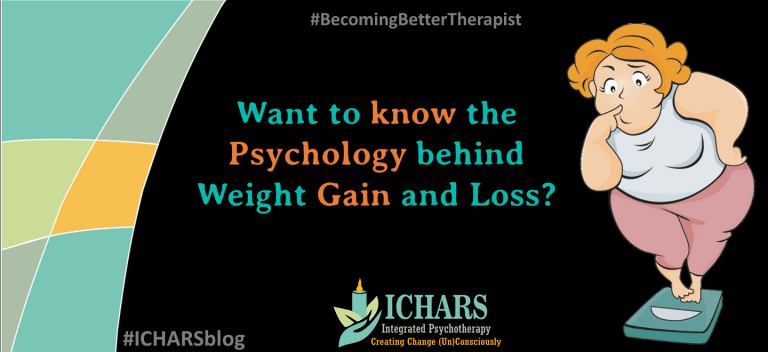Introduction
In this post we will explore not just the biology but also the psychology of weight loss. We will also look at simple steps that can help people manage weight and also explore the steps that therapists can use to help clients overcome weight related issues effectively.
Happiness comes in all shapes and sizes. If you’re overweight, happy and healthy, no problemo! You have every right to feel comfortable in your own skin.
 However, if slipping on to a larger dress size on your last shopping spree made you break into a nervous sweat of horror, you’re on the right page!
However, if slipping on to a larger dress size on your last shopping spree made you break into a nervous sweat of horror, you’re on the right page!
Data released by the World Obesity Federation shows that the percentage of Indian adults living with obesity is set to jump to around 5% by 2025, from 3.7% in 2014. Also, by 2025, India will have over 17 million obese children and stand second among 184 countries where the number of obese children is concerned, according to a study. Thus, it is clear that obesity and weight-related diseases like diabetes, the risk of stroke, etc. are on the rise.
Understanding Psychology of Weight Loss
No doubt, to a large extent weight gain is biologically rooted. We eat for survival. However, hunger is both physiologically and psychologically regulated.
Physiologically speaking, the moment your blood glucose level drops, a need for food is detected by the brain. We all have a set point to which our body weight tends to return more or less by making adjustments in food intake and energy expenditure. This set point is not just biologically determined but also psychologically affected. Hence, worry not! Even if you inherited those genes of obesity from your forefathers, there still is hope!
Psychology of hunger
The psychology of hunger can very much manipulate the number shown by the weighing scale.
- For instance, researchers have found that when we are given access to a wide variety of tasty food like that at a wedding buffet, we tend to overeat.
- Another factor operating at the wedding dinner table is that of social facilitation—a phenomenon which states that we eat more when we savour a meal in the presence of others.
- Yet another explanation for widening waistlines is unit bias i.e. we eat more because our standard portion size itself is large. For instance, in one experiment led by researcher Brian Wansink, it was found that even nutritionists ate 31% more of ice cream when they were given big instead of small bowls and 14.5% more when they were provided with a large instead of a small scoop.
- The hunger response is also partially guided by our memory of when we last ate. Thus, an amnesic may eat 3 whole meals within a gap of 20 minutes just because she has no idea of when she last ate, even though physiologically speaking, her stomach is well satiated.
- And of course, there are those carbohydrate-rich comfort foods which momentarily make the whole world seem slightly better but make us regret later.
Experiencing suppressed anger for your insulting boss? Reach for that Cadbury.
The woman of your dreams rejected you? Grab the extra large fries from Macdonald’s on your way back home.
A lonely new first-year hostel student? Eat 10 of those besan ke laddus Maa packed while watching a chick flick.
The aroma of fresh frying pakodas from the street side bring a wave of nostalgia about that monsoon evening from your childhood? Go help yourself!
The words mentioned in bold are red flags for indulgence in comfort/ emotional eating.
- Very often when we find ourselves dangerously crossing our set point weight, we start following diet plans that are either self-formulated or prescribed by dieticians. However, dieting often goes haywire in our fast-paced schedule and we may end up experiencing what Herman and Polivy referred to as the What-The-Hell logic.
According to this effect, once we break a diet rule, we keep on breaking more of them because we rationalize, “I have already eaten too much cake. Now helping myself to that glass of sugary punch won’t hurt because, what the hell, I am no good at this diet stuff anyway!” You are already feeling guilty about losing control and now to compensate for it you believe that you might as well enjoy yourself in this failure.
- Lastly, the media plays mind games too to sell their diet foods. Doesn’t the flat tummy of Shraddha Kapoor in the Lipton Green Tea advertisement make you feel a little envious? Also, the widespread social media has rigidly set the glorious standards of beauty at the 36-24-36 figure for women and 6 pack abs for men. In this ‘like culture’, we are very likely to succumb to the unrealistic body image requirements for acceptance.
It is thus not uncommon to hear that eating disorders like bulimia nervosa, anorexia nervosa and binge eating are on a rise, especially among women.

Steps to use the psychology of weight loss to shed the extra kilos and manage weight?
- Maintain a food diary: Keep a record of all that you eat and when you eat it. Especially, make notes of how you felt before and after eating. This might help diagnose comfort eating and the feelings that trigger it. Once you know this, replace comfort food for some other pleasurable activity (e.g. dancing), preferably one that involves bodily movement so that you get some exercise while enjoying at the same time.
- Want versus Need: Eat when you need it, not when you want it. Yes, that leftover slice of pizza might look irresistible but say “No” to yourself if it is 2 o’clock in the night and you are up tossing and turning in your bed. Time yourself. Try eating according to a schedule but don’t let that schedule drive your hunger either.
- Self-help and Social Support: Say you can do it and surround yourself with people who say that you can. Put up sticky notes on your desk and lunch box about eating healthy. It gets difficult when your mother is culturally driven to judge your well being according to the amount of ghee that is slathered on your chapattis. Explain why you need to lose weight and promote others in adopting a healthy lifestyle too.
- Focus – the Golden Rule: When eating an important meal of the day, make sure that you focus on each morsel that your chew instead of getting absorbed by the TV screen and eating out of a dabba to your heart’s content. Stay mindful.
- Time to clean those kitchen shelves: Replace all your unhealthy food tins with healthy snacks that will reduce the damaging effects of a mid-afternoon craving. When you don’t have the option to select a fatty food item, you will automatically pick the baked one that is available.
Diet is often perceived as a draconian term with punitive feelings attached to it because of the restrictions it entails. However, now we know the influential role that our psyche plays in weight gain and weight loss. Thus, what is really required is a change of perspective whereby we come to see this weight control regime as actually an avenue for attaining empowerment over our mind and body.
Therapists Niche
Cognitive Hypnotic Psychotherapy is a powerful theraputic approach that can help people who are struggling with weight management, understand the psychology of weight loss and use it to manage weight effectively.
How Psychologists can help clients manage weight effectively?

- Identifying the concerned area: Is it weight or is it fat that the client wishes to work with:
It is important to establish the overall concern area for the client. Is it weight or is it Fat? Most people assume working with weight is equal to working with fat. But that is not the case. The approach to therapy, techniques used, assignments given will vary depending upon the actual concern of the client. NLP meta-model can help the therapist help the client get clarity about the objective of the therapy. - Working on setting and achieving their weight / fat goal (gain or loss, depending on the client)
The therapist can use an effective goal setting and achievement model, such as SOFT-SEA by ICHARS, to help the client define their precise weight management goal and any other goals related to it, such as self-image. The therapist can then help the client initially through Hypnotic suggestions and reinforcement. - Work with Skills and Emotions
Find hindering emotions and thought patterns that the client has not been able to overcome, or the ones that have so far been limiting/stopping the client from taking action like exercising, managing diet, sleeping well…. that are important to reach the ideal weight. Techniques like If-Then statements, Anchoring, Metaphor Therapy, Submodalities… can be used to replace the hindering emotions and thought patterns with more useful thoughts, emotions and strategies. - Work with deeper issues (if required)
There are times when the client is doing everything they should to manage the weight, be it managing diet, exercising regularly, sleeping properly… but there seems to be no effect on the weight. In such cases, it is quite possible that the weight is a result of emotional issues or some secondary gain. Identifying and resolving these deeper issues that are the cause of excess or low weight becomes important in such cases. Hypnotic metaphors, delayering techniques and certain versions of regression techniques, NLP timeline produce best results. - Deal with co-morbid issues
Severe obesity can have adverse effects on physical and psychological health. While being obese is considered a medical concern, the main cause for concern behind obesity is the increased risk of developing one of the many associated comorbid conditions. These co-morbid conditions can further have adverse psychological effects on the client. A combination of Hypnosis, CBT and metaphors can also help with co-morbid issues related to weight.
If you are a psychologist who wishes to learn more about an eclectic apporach that can help you work effectively with weight management and other issues, search for the comprehensive Cognitive Hypnotic Psychotherapy™ Program.

